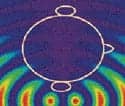We’ve been hearing a lot about coffee and its influence on our bodies. This month’s blogpost is from the Dizziness Depot blog of Alan Desmond at: hearinghealthmatters.org/dizzinessdepot
— David H. Kirkwood, HearingHealthMatters.org


Alan Desmond, AuD, is the author of two textbooks, several book chapters, and two educational booklets for primary care physicians, all related to dizziness and vertigo. He is a co-author of the Clinical Practice Guideline for Benign Paroxysmal Positional Vertigo, and represents the American Academy of Audiology at the American Medical Association. He is the founder/director of Blue Ridge Hearing and Balance Clinic in Bluefield and Princeton, WVa. His blog—using input from many of the world’s best experts in the balance business—looks at the science of vestibular diagnosis and treatment, while also posing the question why there are very few fully equipped balance clinics. Dr Desmond lives in Davidson, NC, with his wife and teenage daughter.
A few weeks ago, my friend and blog editor, Holly Hosford Dunn, PhD, posted a blog about the pros and cons of drinking coffee. I love my morning home brewed Starbucks, yet I have told many patients over the years to avoid caffeine if there was any suspicion of Ménière’s disease.
It got me thinking. Where is the evidence? Is this unfounded conventional wisdom, or can we assure our patients that reducing caffeine will make a positive difference for them?
Hmmm…Caffeine is a diuretic, and we recommend diuretics as a treatment for patients with suspected Ménière’s disease, yet we tell them to avoid caffeine. I think a little online detective work is in order.
First stop: How effective a diuretic is coffee? I found the following Q&A on the Mayo Clinic Web site. Katherine Zeratsky, RD, LD, a registered dietician working at the Mayo Clinic in Rochester, Minn, posted the following:
Question: Caffeine: Is it dehydrating or not? I’ve been seeing ads that say cola and coffee drinks hydrate you as well as water does. Is this true?
Answer: It is true. Researchers used to believe that caffeinated drinks had a diuretic effect. This means that you would urinate more after drinking them, which could increase your risk of becoming dehydrated. Recent research shows that this is not true and that caffeine has a diuretic effect only if you consume large amounts of it—more than 500 to 600 milligrams (the equivalent of 5 to 7 cups of coffee) a day. Still, caffeinated drinks can make you jittery, sleepless, or anxious. Water is probably your best bet to stay hydrated. It’s calorie-free, caffeine-free, inexpensive, and readily available.1
Okay, so the diuretic effect of coffee is negligible.
Second stop: Are other vestibular specialists also recommending reduced caffeine intake for suspected Ménière’s patients?
Among other sources, I checked on the Web site of Dr Tim Hain, a neurologist at Northwestern University. His site is a major source of well-researched information for both patients and professionals. I found this excerpt regarding a recommended diet:
Avoid caffeine-containing fluids and foods (such as coffee, tea, and chocolate). Caffeine has stimulant properties that may make your symptoms worse. Caffeine also may make tinnitus louder. Large amounts of caffeine may trigger migraine.2
Well, I am not tackling tinnitus today, though my friend and blogger-colleague Bob Traynor has done so in several of his blogposts.3 But I did learn that nearly every source I found recommends reduced caffeine for Ménière’s patients. So, the third stop for today…
Is there evidence to support the widely held belief that there is a connection between caffeine and vestibular patients? My background in writing articles and books leads me directly to PubMed, a clearinghouse for professional peer-reviewed journal articles. I typed in “caffeine” and “Meniere’s disease,” and here is what I found:
Yes, that’s one line of nothing pertinent. But I did run across an interesting article discussing the differential diagnosis and treatment for both Ménière’s disease and migraine.
My thought process then steers me toward wondering about migraine patients, who are so often confused with Ménière’s patients. Is there any evidence that caffeine might trigger episodes of vertigo in migraine patients? The above-mentioned article recommends reduction of caffeine to avoid migraine symptoms.
So, this time, I check in with the Cleveland Clinic Web site to read up on migraine and caffeine. Here is what I found:
Caffeine: Excessive caffeine consumption or withdrawal from caffeine can cause headaches when the caffeine level abruptly drops. The blood vessels seem to become sensitized to caffeine, and when caffeine is not ingested, a headache may occur. Caffeine itself is often helpful in treating acute migraine attacks.4
Conclusion
Treatment of both migraine and Ménière’s disease falls into the scope of practice of a medical doctor—usually a neurologist or otolaryngologist (ENT). I am neither, so I invite any reader who can offer a clearer explanation and/or some evidence that I have been unable to locate to add to this discussion.
References
- Zeratsky K. Caffeine: Is it dehydrating or not? Mayo Clinic website. Available at: www.mayoclinic.com/health/caffeinated-drinks/AN01661.
- Hain T. Ménière’s Disease. Available at: www.tchain.com/otoneurology/disorders/menieres/menieres.html
- Traynor R. Hearing international blog. Hearing Health Matters website. Available at: hearinghealthmatters.org/hearinginternational
- What is a migrane headache? Cleveland Clinic website. Available at: my.clevelandclinic.org/disorders/migraine_headache/hic_migraine_headaches.aspx




